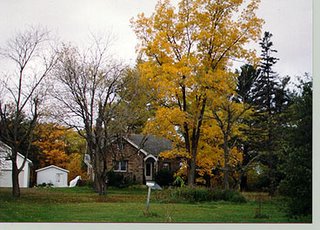Corbett's Law
 You know how, when you don't know anything about a thing, it seems so esoteric, but once you learn about it, you take it for granted, you feel everybody in the world must know, must always have known it? Is there a name for that?
You know how, when you don't know anything about a thing, it seems so esoteric, but once you learn about it, you take it for granted, you feel everybody in the world must know, must always have known it? Is there a name for that?If there is, and I find it out, I'll feel like I should have known it all along! But meanwhile, I'm giving it my own label: Corbett's Law.
There have only been a couple of times in my life that I have observed something, or figured something out, and it felt like a real discovery, and continued to feel that way. In fact, there's only one observation of that nature I can specifically recall: the leaves of the butternut tree all fall off at the same time.
That seems amazing and unusual to me, and I have never read about it or overheard anybody mentioning it, and so it continues to feel like new knowledge to me. It seems like the kind of event that indigenous people would create a holiday around: the day the butternut leaves fall. Like the day the swallows come back to Capistrano. Perhaps somewhere, at some time, somebody did, but it's lost to history. In the suburban neighborhood where I used to live in Wilbraham, Massachusetts, and which was lined with butternut trees, however, nobody seemed to notice or care. It's a good bet that I was the only person on the street who even knew those trees were butternuts.
They had fruits the size, shape, and color of limes, but hard enough to brain you with. When cars ran them over they left a mess. The rinds or husks or whatever they are on the unripe nuts leave a terrible stain, on your hands or on the asphalt. The shell is tough to crack, and the meat even tougher to get out....impossible to extract in one piece....I can imagine pioneer children spending the whole winter by the firelight working doggedly to pick out the pieces. (Worth it, though. On chocolate cake with chocolate frosting...yummy.)
The leaves of the butternut tree are palmate and turn golden yellow in the fall. One day, the tree is full of leaves and the next it's bare. The ground under the tree will have a wide doughnut of leaves under it, as though the tree had dropped its pants. You go out and rake them all up and that's that. Very neat; perfect for the weekend warrior.
Each tree has its own timer, on the other hand. You'll notice in the picture that one tree is completely full of leaves, while the other two next to it are completely bare. And of course all the maples, oaks and birches aren't nearly as accomodating, so the yard's a mess till spring anyhow.
Unfortunately, in the scheme of things an intimate knowledge of the habits of the butternut isn't a drop in the bucket compared to all the other things you have to keep in your head--and wonder if you should be trying to put into other people's, if you're a teacher or a writer at any rate. I'm presently researching ideas for articles, and it seems that everything's already been said. I just stumbled across the Festa della Donna, an Italian holiday with origins in the Triangle Shirtwaist Fire of 1911 in Manhattan. It seemed so wonderfully obscure to me--yesterday--but suddenly I find myself wondering if it's old hat--to everyone else, at least. Or of no possible interest to anyone except a few weirdos like me. That's Corbett's Law in a nutshell.
Labels: Corbett's Law, Festa della Donna, Triangle Shirtwaist Fire, Wilbraham

